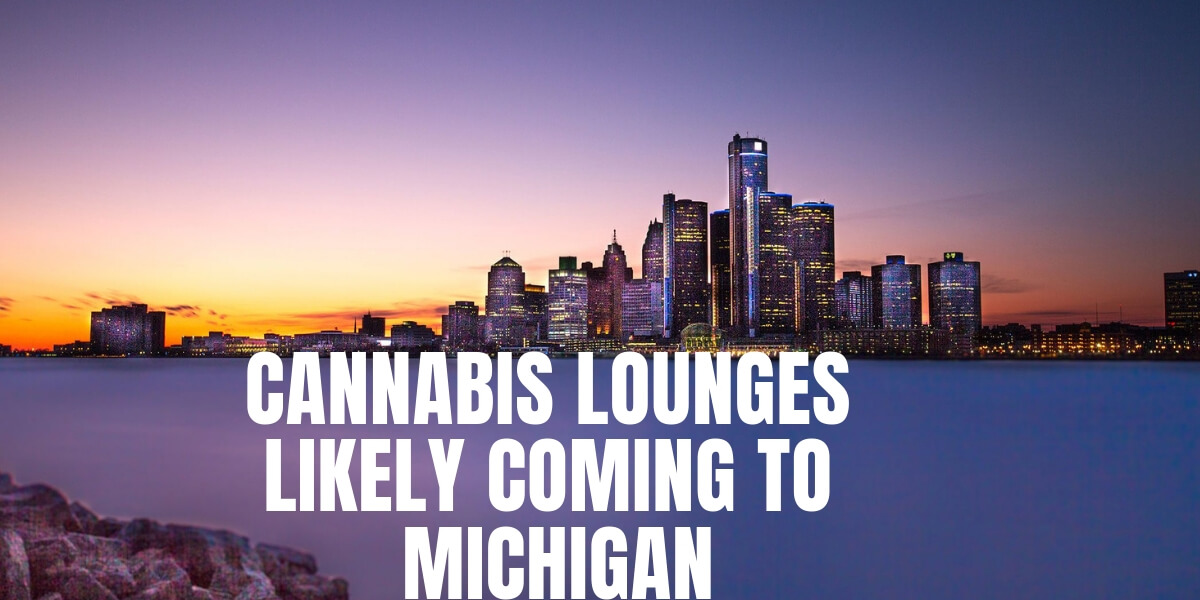Marijuana lounges have been around for a while. Popular in Amsterdam and parts of Canada, cannabis lounges—also sometimes called “coffee shops”—are popular among tourists and locals alike. Similar to a bar, they are places where cannabis consumers can relax, smoke, and socialize with other marijuana users. These concepts have made their way into states that have legalized recreational marijuana here in the U.S., and will be making their way to Michigan in the near future.
The Michigan Medical Marijuana Act (MMMA) prohibits the consumption of marijuana by a patient in any public place. The Medical Marijuana Facilities Licensing Act (MMFLA) did not change the consumption laws initially set out by the MMMA. Like the MMMA and MMFLA before it, Proposal 1, or the Michigan Regulation and Taxation of Marijuana Act (MRTMA), also does not allow public use of marijuana. However, as you may have already read in our previous article, the MRTMA does allow for onsite consumption in limited circumstances.
What does that mean for lounges? Currently, marijuana lounges are legal if they are on private property, though under current law, the owners would not be able to sell cannabis to their customers. This article will explore what you need to do to have a legally operating cannabis lounge and explore developments in other states as a way to discern what rules will likely come into play here in Michigan.
NOW
Operating a marijuana lounge under the MMMA can be kind of tricky. First and foremost, you need to make sure your lounge is not considered a public area. How can you do this? The logical first step would be to make your lounge a private club. Your private club could charge a monthly or yearly fee to become a member and could also charge an additional entry fee at the door. Your private club could also charge to “rent” equipment, such as pens and smoking accessories. This would meet the requirements of the MMMA, MMFLA and MRTMA in that the public would not be invited to your establishment. However, to operate legally you could not be open to the public and members would need to bring their own marijuana.
Lounges have also experimented with selling food and beverages in their clubs as well as pay to play games such as pool, darts, etc. This makes sense since monthly/yearly fees, coupled with entry and “rental” fees, would likely not generate enough income to make any sort of substantial profit. Some lounges have experimented with additional entrance fees for theme days, movie screenings, etc.
While there are no state laws that would directly prohibit this business model, it would still be subject to municipal regulations, which can vary widely from city to city and township to township. You would also need to make sure you check your members medical marijuana cards or IDs before allowing entry, similar to a bar. Even so, it is hard to get excited about this business model under the current medical laws since these lounges would need to charge its members exorbitant fees in order to make any sort of substantial profit.
WHAT’S IN THE PIPELINE
While the cannabis lounge concept may not be particular attractive right now, we do expect it to gain traction once the MRTMA is being implemented. The MRTMA allows for on-site consumption, subject to municipal regulations. More importantly, the MRTMA microbusiness license —when combined with on-site consumption, would allow business owners to not only open up to the general public, but also to sell marijuana to its customers.
One important caveat is that on-site consumption will mostly be regulated at the municipal level. While there will still be some state level rules—e.g. no tobacco or alcohol can be sold or permitted on the premises, and a separate state consumption license may be needed—microbusiness owners will need to make sure that their municipality is on board with their cannabis lounge concept before going full steam ahead.
OTHER STATES
Luckily for us, Michigan is not the first state to legalize marijuana for recreational use and allow for on-site consumption. States like California, Nevada and Colorado have already opened lounges or are in the process of allowing lounges to open, and like Michigan, they allow for municipalities to regulate on-site consumption. We can therefore look to municipalities in these states as a guide to how Michigan municipalities may decide to regulate the issue of on-site consumption, and cannabis lounges in particular.
CALIFORNIA
SAN FRANCISCO
San Francisco was the first city in California to fully embrace the marijuana lounge business model. San Francisco is no stranger to being at the forefront of marijuana consumption laws. The city has allowed medical marijuana patients to smoke in dispensaries for years. Public comment on the San Francisco Department of Public Health’s (SFDH) proposed rules regarding cannabis consumption ended more than a month ago.
SFDH will be in charge of issuing Cannabis Consumption Permits. The proposed rules are what you would expect. No alcohol or tobacco use, extensive ventilation requirements, a variety of permit types, and smoking room requirements. Lounges currently in operation are operating under the previous rules in San Francisco, which should not change very much with the proposed rules. What the proposed rules really do is establish a regulatory framework for consumption, and a fee schedule for permit types.
The most interesting part about this consumption permit is the different types of permits available. Type A permits allow for consumption of only pre-packaged marijuana. Type B permits allow for consumption of pre-packaged marijuana, as well as the limited production of marijuana products for customers to consume. A type C permit is titled “Cannabis Smoking” and clearly lists on-site smoking as a perk. Which means that types A and B are more than likely referencing non-smoking consumption. The permit fees range from $800-$1200, and that does not include other fees needed to procure the permit, including an application fee, Fire department referral fee, and site plan check fee.
WEST HOLLYWOOD
West Hollywood is one of the newest cities to embrace the marijuana lounge model. Like San Francisco, West Hollywood has specifically divided the consumption lounges by type of consumption allowed. With one permit allowing edible only consumption and another allowing all types of consumption. The rules promulgated by West Hollywood are very similar to those proposed in San Francisco.
West Hollywood maintains strict ventilation requirements, zoning restrictions, no sale of alcohol and tobacco, and specific smoking requirements, among other requirements. Specifically, for a lounge permitted for smoking and vaping, the lounge area must be separated from the retail in such a way that the smoke or odor does not enter the retail area. Similar to many Michigan municipalities treatment of provisioning center licenses, another key restriction in West Hollywood code is a cap on the number of facilities that will be licensed by the city.
Interestingly, unlike San Francisco, West Hollywood is subjecting the licensees to the same regulations as other cafes/lounges that allow smoking. This is relevant for our discussion on Michigan and will be addressed later in this article.
LOS ANGELES
Los Angeles (LA) was expected to be the Mecca of recreational marijuana. The biggest city in the biggest state, which is arguably the most pro-marijuana state in the country. However, LA, contrary to popular wisdom, has not opted in to allow marijuana lounges. Given the fact that LA is a vacation and tourist destination, this seems like a lost opportunity. While residents have a home to use their marijuana products, vacationers and renters will not, since most hotels and apartment complexes still do not allow the use of marijuana on their premises.
The chief concern in the LA area is with residents and politicians afraid of nuisances related to lounges, some of those being stoned drivers, unwelcome odors (in the city known for smog), and reduced property values. For those crossing their fingers waiting for a new resolution from the city, it does not appear that one will be forthcoming anytime soon. The city council has yet to even consider the issue of allowing cannabis consumption at businesses. The city at the moment is more focused on zoning regulations. As of November 1, 2018, LA has yet to allow a lounge to open in the city.
However, when reviewing the LA County Office of Cannabis Management site, we came upon a frequently asked questions list. Of course one question was: “where can I consume cannabis?”. To which, the answer was ONLY on private property…sound familiar? If an establishment, had its own private membership base as discussed above, that could be a work around for those looking for safe places to consume cannabis in LA, but that’s still not a business model likely to produce high profits given its limitations.
COLORADO
DENVER
Denver may not be as far west as LA, but it is living up to its moniker as the “Mile High City”. While the consumption laws in Colorado mirror those of almost every state that has legalized recreational marijuana, the city of Denver has taken a slightly different approach to on-site cannabis consumption. Specifically, Denver allows an establishment to acquire a cannabis consumption license on existing businesses and if granted can designate a portion of their premises where cannabis consumption is allowed.
Denver has mandated that patrons bring their own marijuana, and that locations do not sell or distribute their own marijuana. However, cannabis consumption lounges in Denver only have one zoning restriction—they must not be within 1,000ft of a school. Otherwise, lounges are able to operate anywhere the underlying business can operate if attached to one. Application requirements mirror the requirements of other cities, with floor plans, ventilation requirements, etc. This would mean that a Michigan provisioning center licensee—or “retail” licensee under the MRTMA—could attach a cannabis lounge to their existing facility.
NEVADA
LAS VEGAS
You may be surprised to hear that “Sin City” has yet to allow marijuana lounges to operate within its city limits. However, recently proposed ordinance amendments aim to change that. Las Vegas has proposed an ordinance to adopt a business license category and land use regulations for social use venues for marijuana. Specifically, the social use venue under Las Vegas law will apply to businesses that allows, as part of its business activity, a location and equipment for the consumption of marijuana or marijuana products.
The fee for the license will be $5,000 annually, a little steeper than most of the previous cities we have used as examples. The operational requirements match those of the cities discussed above, with slight differences. The social use venues cannot store marijuana products and would be subject to specific video surveillance requirements as well as restrictions on the sale of beer and wine in the establishment.
The city has also included in the ordinance setbacks from schools and other public gathering spots, which are 1000ft and 300ft respectively. Since Nevada has legalized marijuana they have run into similar problems as LA. Specifically, it is a popular vacation destination that allows people to purchase marijuana, but offers consumers no place to legally consume it. Las Vegas unlike LA is presenting a solution to this problem and a way for tourists and renters alike to legally and safely consume their marijuana.
WHAT LIES AHEAD FOR MICHIGAN?
Michigan is still in its infancy for recreational marijuana use. As of the time this article was written, we are still about a year away from having full blown government promulgated rules and recreational facilities. Until then we know what is available in the way of marijuana lounges. They are the “private-club” models that limit your ability as a patron and business owner to really take advantage of the new laws, but they will have to do for now.
Michigan is a big state, and we already expect there to be many cities to take the approach that LA has taken and either completely opt-out of any cannabis consumption licenses, but we also do expect a lot of cities to embrace the business models, especially when tied to the microbusiness concept. This is because Michigan’s municipal revenue sharing is tied to the number of cannabis retail outlets AND microbusinesses operating in the municipalities. Thus, municipalities have a strong financial incentive to allow these type of facilities to operate within their boundaries.
Cities all across the state are looking for a much needed economic shot in the arm from the recent legalization of marijuana and could find it in the form of marijuana lounge licenses. All the above cities also have an elaborate fee schedule attached to their cannabis consumption permits, which would allow municipalities to get an increased share of the 10% excise tax as well as direct revenues from permitting and fees. Fees range from $800-$5,000, and we would expect to see similar fees in Michigan cities that will allow cannabis consumption permits.
The MRTMA leaves Michigan with a plethora of options for ways to approach cannabis consumption permits. Michigan cities could allow only the microbusiness licensees to obtain cannabis consumption permits, or it could allow cannabis lounges to be located next to an existing dispensary.
The benefits to these cities are obvious. Amsterdam’s cannabis coffee shops have drawn in tourists from around the world, and cities like Denver have seen spikes in tourism after legalizing recreational marijuana. Allowing cannabis lounges in cities like Detroit could help propel the city as it seeks to become a world-renown tourist destination, not to mention provide additional revenue to the city’s coffers.
TAKE AWAY
This was a long read and if you made it this far you probably still have some questions about what is in store for Michigan…so do we. Unfortunately, at this time we are waiting on the finalization of the MRTMA rules before we know what kind of concrete steps are in store for Michigan.
Nonetheless, the cities referenced above give us a good sample of what Michigan municipal regulations could look like, and it is never too early to state a dialogue with the municipality you are seeking to operate in. Because much of the regulation will likely happen at the local level, business owners looking to start cannabis lounges will need to bring municipalities into the fold early on in the process in order to ensure their business model will be permitted in the area they are looking to operate in.
While Michigan cities may not be as popular a vacation destination as LA or Las Vegas, a similar embrace of cannabis lounge business could help cities like Detroit, Ann Arbor, and Traverse City attract more tourists than they could under prohibition, which would provided a welcomed boost to the economy of these cities and to the state generally.
Our Marijuana Business Attorneys are ready to assist you and introduce you to your market opportunities in Michigan. If you are interested in entering the industry before the boom, contact one of our licensed Cannabis Microbusiness Attorneys for a free consultation.






